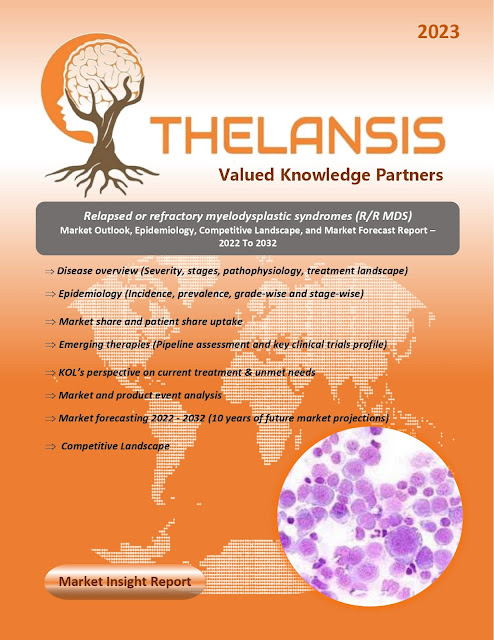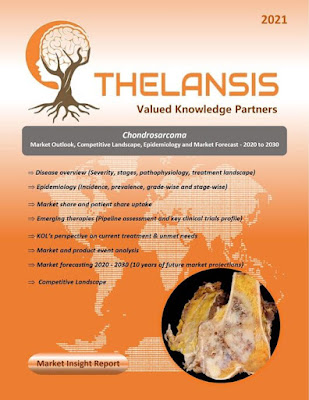Relapsed or Refractory Myelodysplastic Syndromes (R/R MDS) – Market Outlook, Epidemiology, Competitive Landscape, and Market Forecast Report – 2022 To 2032
Myelodysplastic syndromes (MDS) are characterized by ineffective hematopoiesis leading to reduced blood cell production and clonal instability, which carries a potential risk of progressing to acute myeloid leukemia (AML). Individuals affected by MDS experience a significant burden of symptoms and are also susceptible to mortality due to complications arising from reduced blood cell counts and the development of AML. The etiology of MDS is currently understood in only 15% of cases. Inherited susceptibility to MDS is observed in approximately one-third of pediatric MDS cases, encompassing conditions such as Down syndrome, Fanconi anemia, and neurofibromatosis. While less common in adults, an inherited predisposition should be considered when MDS arises in young adults or families with a history of MDS, AML, or aplastic anemia. Familial instances of MDS have been associated with point mutations in various genes, including DDX41, GATA2, RUNX1, ANKRD26, ETV6, and genes related to the telomerase complex (TERC and TERT). Environmental factors contributing to MDS include prior exposure to chemotherapeutic agents, particularly alkylating agents, and purine analogs, as well as radiotherapy or ionizing radiation and tobacco use. Noteworthy occupational factors encompass benzene and its derivatives, with a heightened incidence of MDS among agricultural and industrial workers. Diagnosing MDS involves assessing blood and bone marrow samples, revealing reduced blood cell counts and typically hypercellular (though sometimes hypocellular) marrow displaying dysplastic features, possibly accompanied by an excess of immature cells (blasts). Patients grappling with relapsed or refractory higher-risk myelodysplastic syndromes have a discouraging median overall survival ranging from 4.3 to 5.6 months, along with a 28% one-year survival probability following the failure of the two endorsed hypomethylating agents, namely azacitidine (Aza) and decitabine (Dec).
·
The prevalence of myelodysplastic syndrome in
the United States population is approximately 3.4 cases per 100,000 individuals.
Thelansis’s “Relapsed or Refractory
Myelodysplastic Syndromes (R/R MDS) Market Outlook, Epidemiology, Competitive
Landscape, and Market Forecast Report – 2022 To 2032" covers disease
overview, epidemiology, drug utilization, prescription share analysis,
competitive landscape, clinical practice, regulatory landscape, patient share,
market uptake, market forecast, and key market insights under the potential Relapsed
or Refractory Myelodysplastic Syndromes (R/R MDS) treatment modalities options
for eight major markets (USA, Germany, France, Italy, Spain, UK, Japan, and
China).
KOLs insights
of Relapsed or Refractory Myelodysplastic Syndromes (R/R MDS) across 8 MM
market from the centre of Excellence/ Public/ Private hospitals participated in
the study. Insights around current treatment landscape, epidemiology, clinical
characteristics, future treatment paradigm, and Unmet needs.
Relapsed or Refractory Myelodysplastic
Syndromes (R/R MDS) Market
Forecast Patient Based Forecast Model (MS. Excel Based Automated
Dashboard), which Data Inputs with sourcing, Market Event, and Product Event,
Country specific Forecast Model, Market uptake and patient share uptake,
Attribute Analysis, Analog Analysis, Disease burden, and pricing scenario,
Summary, and Insights.
Thelansis Competitive Intelligence (CI) practice
has been established based on a deep understanding of the pharma/biotech
business environment to provide an optimized support system to all levels of
the decision-making process. It enables business leaders in forward-thinking
and proactive decision-making. Thelansis supports scientific and commercial
teams in seamless CI support by creating an AI/ ML-based technology-driven
platform that manages the data flow from primary and secondary sources.


Comments
Post a Comment